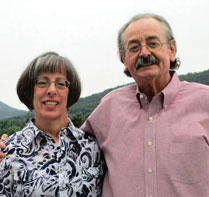Full Circle
 |
Jeanne Welch never saw herself as college material.
Even when she completed some mental health training and began working at a UAB transitional home for individuals leaving state mental hospitals, "I still wasn't thinking about college," she says. "I was interested in helping people achieve their life goals."
Then a work acquaintance, a UAB social work student, "pointed out that I was already doing social work," Welch says. "I decided to see if I could strengthen my education and training."
A CRITICAL CONVERSATION
An appointment with Dr. Norman Eggleston, then chair of the UAB Department of Social Work, transformed Welch's thinking and set her on a new academic path. He also convinced her to pursue a four-year degree rather than a two-year degree, "to give me more independence and flexibility," she says.
Welch also had a firm timeline in mind: She had to graduate in the spring of 1980. Eggleston and Dr. Gail Wykle—Welch's faculty advisor—helped her find a way. "I mapped out the whole plan based on what classes were taught in the daytime or at night," Welch says. Other faculty lent their support, she adds. "Being able to meet with faculty after classes was helpful. The investment they made in me was significant and meaningful. They would ask me how things were going—not just in my classes but in my job too."
THE POTENTIAL FOR MORE
Welch thought an undergraduate degree would complete her academic career, but "Dr. Eggleston started planting seeds that I could and should continue my education and training," she says. "I still have the recommendation letters from Dr. Eggleston, Tom Kemp, and Gail Wykle. They could see the potential in me, even when I didn't see it in myself."
She was accepted to the graduate social work program at Virginia Commonwealth University—Welch describes it as "a one-year advanced-standing program." And she wasted no time jumping into her new curriculum, she says. "When I graduated with my bachelor's in social work, I couldn't [walk at commencement] because I had less than 24 hours to get to graduate school!"
A MEANINGFUL CAREER
After graduating in June 1981, Welch became a social worker for adults with developmental disabilities. Eventually, she landed at one of Virginia's Community Services Boards, which provides community mental health therapy to outpatients. For 15 years, "as a licensed clinical social worker, I gained both clinical and administrative experience as we counseled patients dealing with depression, sexual abuse, relationship problems, and more," she says.
The role often became emotionally and psychologically challenging, Welch says, but she could stave off burnout by relying on her training—and by focusing on positive outcomes. "Seeing [patients] progress is gratifying and satisfying," she says. "You know you're making a difference."
Welch, who recently retired, spent the last 11 years of her career as a clinical social worker at the Salem Veterans Affairs Medical Center in Salem, Virginia. "Being raised in an Air Force family, I knew the sacrifices that the veterans and their families had made," she says. "Veterans like being treated by people who can relate to them—they like that feeling of kinship. I felt my life had come full circle."
INSPIRATION FOR A NEW GENERATION
Welch's thoughts returned to UAB and Dr. Eggleston several years ago when she and her husband, Jay, a mechanical engineer, prepared a will. "We don't have children, so we thought about what has impacted our lives the most and how to give back."
Welch says her connection to Dr. Eggleston went beyond his academic and professional advice. They shared a home state, Virginia. "And as I learned his life history—how he was raised in foster care and how social workers had such a positive impact on him—it motivated me to continue my social work training," Welch says.
"Dr. Eggleston told me I could achieve anything I put my mind to," she continues. "He gave me that confidence. So when Jay and I were ready to make a gift, I had the opportunity to finish funding the scholarship established in Dr. Eggleston's name. I want to do what I can to help today's students discover their own untapped, unrealized potential."
A gift through your will, or bequest, is a flexible and versatile way to support the area at UAB that means the most to you while allowing you to maintain control over your assets during your lifetime. For more information about bequests or other type of legacy gifts, please contact the Office of Planned Giving at (205) 996-7533 or plannedgiving@uab.edu.
© Pentera, Inc. Planned giving content. All rights reserved.
Disclaimer
